Any Aussie can quickly sniff out a fake blow-in farmer by the crispness of his hat and kit. These two Canberra fly-ins get their shirts supplied and pressed for the cameras. It’s clichéd OMO white-shirt propaganda to hide polly bullshit.
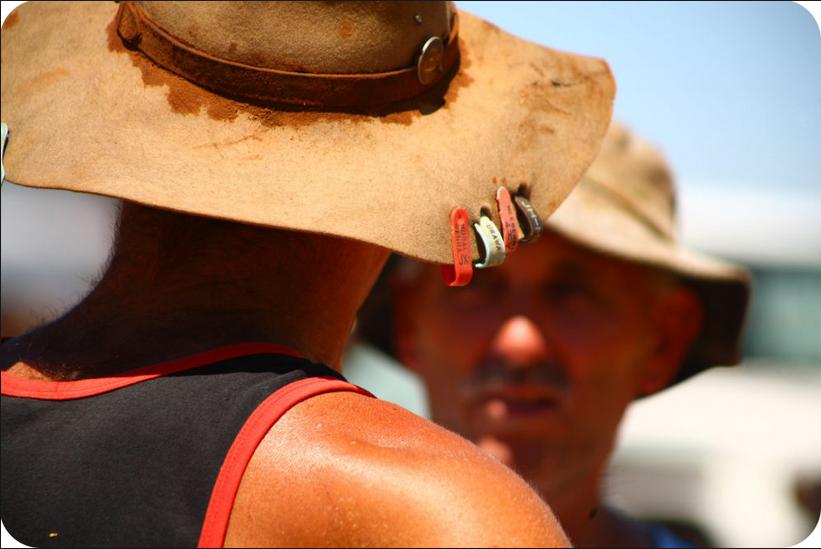
Barnaby, the Fake Farmer
Fat Barnaby Joyce, the National Party’s Lib puppet member for New England, was parachuted in from Queensland and simply doesn’t pass the pub test.
He’s been exposed as a two-timing Kiwi. He reckons foreign ethnic transient backpackers are good for farmers because they are exploited by slave labour rates. The media hide them as “backpackers” but in reality they’re just Third World itinerant backdoor illegals stealing Aussie jobs. That is if the farmers paid decent wages.
But the farmers don’t pay decent Aussie wages in order to compete on a level playing field with cheap imposed Third World import dumping. It’;s that ‘free trade‘ so-called, signed off by Barnaby and his Liberal mates in Canberra. Liberal Sydney-centric Malcolm Turnbull pacified the Gnats by letting Barney Joyce tackle non-urban low priority bush matters, so Mal anointed Barney his Munster west of Parramatta for Agriculture, Water Resources and Desert badlands.
Confirming Joyce’s a cost cutting Kiwi, an Aussie comprehensive survey of 4,322 people on temporary migrant visas, by three universities in Sydney, has painted a grim picture of systemic exploitation of Third World fake students to Australia, with some cases detailing criminal behaviour by employers such as confiscating passports or demanding part of wages back in return for keeping a job.
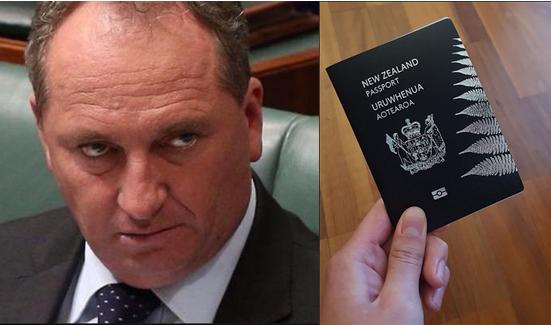 Anti-Australian dual citizen imposter
Anti-Australian dual citizen imposter
Working Holiday visa (subclass 417) is just backdoor immigration
Canberra’s Immigration Working Holiday Visa (subclass 417) is supposed to be “a temporary visa for young people who want to holiday and work in Australia for up to a year. It is a temporary visa that encourages cultural exchange and closer ties between Australia and eligible countries.”
What crap! It is a backdoor way for Third Worlders to migrate to Australia. They come in legit, work six months and then over stay their visa and work illegally.
Then another lot come in as ‘international students’ and once they graduate they latch on to another visa, the Temporary Graduate Visa (subclass 485), which is supposed to be “for international students who have recently graduated from an Australian educational institution” – dodgy or otherwise.
It lets Third Worlders live, study and work in Australia for up to 4 bloody years!
A study at the Australian National University in 2016 found that durations are even longer as transitioning through various temporary visa categories (visa churn) is common.
Take your pick of Australia’s visa fest:
- Electronic Travel Authority (subclass 601)
- eVisitor (subclass 651)
- Transit visa (subclass 771)
- Visitor (subclass 600)
- Work and Holiday visa (subclass 462)
- Working Holiday visa (subclass 417)
- Business Innovation and Investment (permanent) visa (subclass 888)
- Business Innovation and Investment (provisional) visa (subclass 188)
- Business Owner (subclass 890)
- Business Talent (Permanent) visa (subclass 132)
- Distinguished Talent visa (subclass 124)
- Distinguished Talent visa (subclass 858)
- Employer Nomination Scheme (subclass 186)
- Investor Retirement (subclass 405)
- Investor visa (subclass 891)
- Regional Sponsor Migration Scheme (subclass 187)
- Skilled Independent visa (subclass 189)
- Skilled Nominated visa (subclass 190)
- Skilled Recognition Graduate visa (subclass 476)
- Skilled Regional (provisional) visa (subclass 489)
- Skilled Regional visa (subclass 887)
- State or Territory Sponsored Business Owner visa (subclass 892)
- State or Territory Sponsored Investor visa (subclass 893)
- Temporary Activity visa (subclass 408)
- Temporary Graduate visa (subclass 485)
- Temporary Work (International Relations) visa (subclass 403)
- Temporary Work (Short Stay Specialist) visa (subclass 400)
- Temporary Work (Skilled) visa (subclass 457)
- Training visa (subclass 407)
- Student visa (subclass 500)
- Student Guardian visa (subclass 590)
- Adoption visa (subclass 102)
- Aged Dependent Relative visa (subclass 114)
- Aged Dependent Relative visa (subclass 838)
- Aged Parent visa (subclass 804)
- Carer visa (subclass 836)
- Carer visa (subclass 116)
- Child visa (subclass 101)
- Child visa (subclass 802)
- Contributory Aged Parent (Temporary) visa (subclass 884)
- Contributory Aged Parent visa (subclass 864)
- Contributory Parent (Temporary) visa (subclass 173)
- Contributory Parent visa (subclass 143)
- Dependent Child visa (subclass 445)
- New Zealand Citizen Family Relationship (temporary) visa (subclass 461)
- Orphan Relative (subclass 117)
- Orphan Relative (subclass 837)
- Parent visa (subclass 103)
- Partner (Provisional and Migrant) visa (subclass 309 100)
- Partner visa (subclass 801 820)
- Prospective Marriage visa (subclass 300)
- Remaining Relative visa (subclass 115)
- Remaining Relative visa (subclass 835)
- Global Special Humanitarian (subclass 202)
- In country Special Humanitarian (subclass 201)
- Protection visa (subclass 866)
- Refugee visa (subclass 200)
- Women at Risk visa (subclass 204)
- Emergency rescue visa (subclass 203)
- Bridging visa A –BVA- (subclass 010)
- Bridging visa B – BVB – (subclass 020)
- Bridging visa C – BVC – (subclass 030)
- Bridging visa D – BVD – (subclass 040 and 041)
- Bridging visa E – BVE – (subclass 050 and 051)
- Crew Travel Authority visa (subclass 942)
- Former Resident visa (subclass 151)
- Maritime Crew visa (subclass 988)
- Medical Treatment visa (subclass 602)
- Resident Return visa (subclass 155 157)
- Special Category visa (subclass 444)
- Special Purpose visa
While under-researched and politically hidden by their associations with education and tourism, rather than labour migration, these schemes are creating diverse flows of migrants – hybrids of ‘tourist’, ‘student’, and ‘worker’.
And the trade is largely driven by migration agencies who are mostly Third World foreign themselves.
‘Wage Theft’ in Australia Report 2017
The University of New South Wales has just released a report from a national survey of 4,322 temporary migrants from 107 countries in all states and territories. It was a joint survey with UTS, authored by Laurie Berg, a senior law lecturer at UTS, and Bassina Farbenblum, a senior law lecturer at UNSW Sydney.
The survey has uncovered widespread exploitation of backpackers and international students working in a range of industries. As if we didn’t know already.
A third of backpackers and a quarter of foreign Third World students from mainly asia in Australia are being routinely underpaid by employers who are paying them half the minimum wage or less. A third of backpackers and a quarter of foreign students in Australia are being routinely ripped off by employers who are paying them $12 an hour or less, half the minimum wage.
One in three international students and backpackers are paid about half the legal minimum wage, according to a major new report, Wage Theft in Australia, the most comprehensive study of temporary migrants’ work and conditions in Australia. And it has nothing to do with non-English speaking migrants not knowing the minimum wage. Students from European nations such as Germany or Italy fared even worse, with more than a third earning less than $12.
In fruit and vegetable picking – which foreign Third World backpackers must do for 88 days in a rural area order to qualify for a second-year working holiday visa – the degree of wage theft was extreme. Almost one in seven participants working in fruit and vegetable picking and farm work earned $5 an hour or less. Almost a third (31%) earned $10 or less.
For fruit picking and the like the Australian Minumum Wage is $25.60 per hour for a casual employee, and most are casuals because the picking season is temporary.
But the joint university survey found that “86% of foreign students and backpackers are paid just $15 per hour“. Most are paid in cash and most through dodgy labour hire firms, so that the actual employer can claim ignorance. Paying cash is not illegal but half never or rarely receive a payslip, which is an offence. This makes it extremely difficult to seek redress and points to widespread tax avoidance by employers.
Co-author Laurie Berg calls it “wage theft” and says is not confined to fruit and vegetable picking or convenience stores, nor is it confined to any nationalities. Other industries with poor track records were convenience stores, carwashes and work in homes such as nannying and cleaning.
“A fifth of every nationality was paid around half the legal minimum wage. For almost 40% of students and backpackers, their lowest paid job was in a cafe, restaurant or takeaway.”
Berg says the study also shows foreign students and backpackers encounter conditions that may constitute criminal forced labour. And the unions turn a blind eye.
In 91 cases, respondents had had their passports confiscated by employers; 173 respondents were required to pay upfront “deposits” of up to $1000 to secure a job in Australia; and 112 respondents had been asked to pay money back to their employer in cash after receiving their wages.
The study also found 44% of overseas workers are paid in cash, including two in three waiters, kitchen-hands and food servers. Half never or rarely receive a payslip.
Co-author Bassina Farbenblum says “It provides compelling evidence for expanded services that respond to temporary migrants’ experiences, as shared directly by them.”
The survey revealed the practice of wage theft was widespread and there had not been an effective response from the Australian government, unions or employer groups. The study raises urgent concerns about the actions and resourcing required of government, business, unions and other service providers to address the scale of non-compliance.
Key points:
- A quarter of all international students earn $12 per hour or less and 43% earn $15 or less in their lowest paid job.
- A third of backpackers earn $12 per hour or less and almost half earn $15 or less in their lowest paid job.
- Workers from Asian countries including China, Taiwan and Vietnam receive lower wage rates than those from North America, Ireland and the UK. Chinese workers are also more likely to be paid in cash.
About the survey:
● Anonymous, online survey of 4,322 people who had worked in Australia on a temporary visa.
● Available in 12 languages as well as English.
● Focused on participants’ lowest paid job in Australia.
● 2392 respondents were foreign students; 1,705 were enrolled at a university and 523 at a vocational or English-language college.
● 1440 respondents were backpackers (Working Holiday Makers).
● The remainder worked in Australian on other temporary visas, including tourists.
‘Wage Theft’ just like the Sugar Slaves and Blackbirding of Old
But other reports have found pure slavery. Seasonal farm workers receiving as little as $0 a week after deductions by greedy illegal labour hire firms – caravan rent, superannuation, health insurance, transport fees, food, tax.
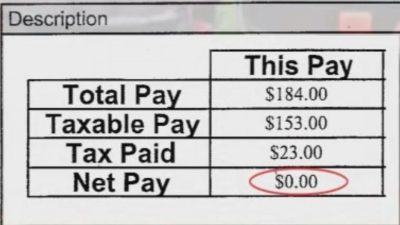
It’s like the indentured labour of Pacific islander workers to north Queensland from the 1860s to work for pittance on the sugar plantations. The first of Queensland’s blackbirded men arrived in Moreton Bay on the ship Don Juan in 1863, and worked on a cotton plantation.
Most were originally from Vanuatu and the Solomon Islands, however workers were also “recruited” from the Loyalty Islands (part of New Caledonia), Papua New Guinea, Tuvalu, Kiribati and Fiji. In total, around 62,000 Pacific Islanders were taken to Australia to work on plantations in Queensland, often by force or trickery – the practice was known as “blackbirding“.
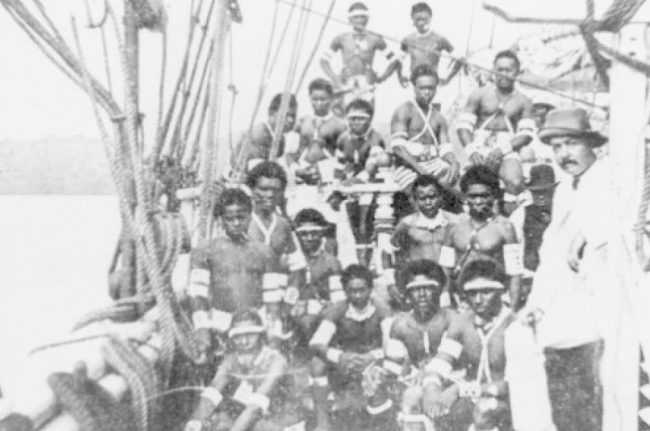
South Sea Islanders were consigned to a lifetime of slavery in the cane fields of North Queensland, and many died in the cane fields. At the end of the week they’d just dig a big hole and put them in a mass grave so there are lots of mass graves in the Townsville, Ayr, Ingham area that Pacific Islanders are buried in.
The Australian sugar industry was built quite literally off the backs of slave labour.
What’s changed under Agriculture Muster Barney?
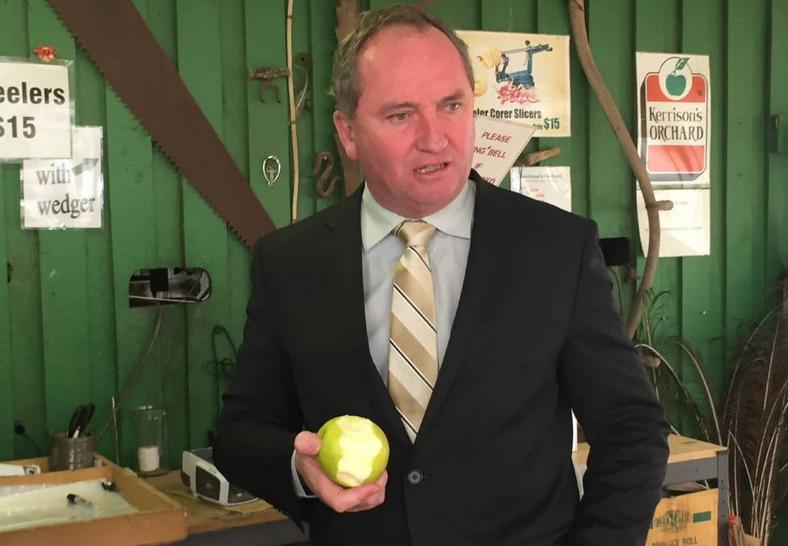
Fake Farmer: “I know a kiwi when I taste one.”